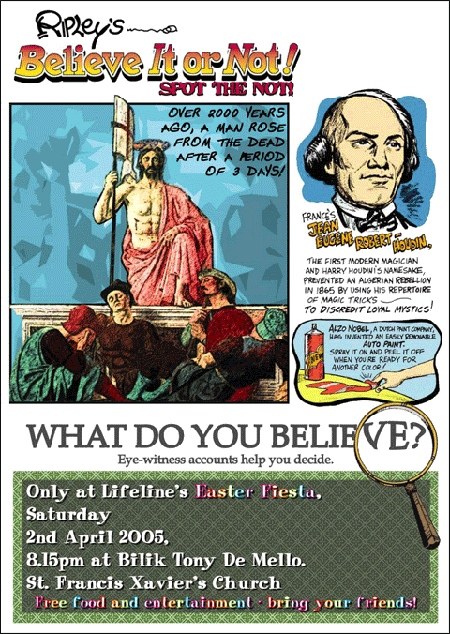"Hansen's disease, commonly known as leprosy, is an infectious disease caused by infection by Mycobacterium leprae. The modern name of the disease comes from the discoverer of Mycobacterium leprae, G. A. Hansen. Sufferers from Hansen's disease have generally been called lepers, although this term is falling into disuse both from the diminishing number of leprosy patients and from pressure to avoid the demeaning connotations of the term. Also, this term can lead to public misunderstanding because the terms leprosy and leper are used in the Bible to describe a wide range of incurable skin conditions."
- Wikipedia.com
I never knew there was an asylum for the leprosy patients here in Malaysia. Heck, i didn't even know there were leprosy patients in Malaysia! Until Water Into Wine organized a trip to the Leprosy Centre in Sungai Buloh (today) as a Lifeline Outreach.
There were altogether 30 of us who visited the centre. We were divided into groups of 6 or 7 and went about visiting the patients in the wards; distributing food (angku kueh and pulut) as well as bars of soap. Most of the patients were between the age of 50 and above. Some were disfigured while many others had various parts of their body missing.
Even before I entered the ward, I felt uncomfortable. I am not sure what I should say or do. I was also afraid to touch them, not only because of the disease they had. But it was also because I was afraid that by touching them (especially parts where their hands once were) it might hurt their feelings. But I swallowed my fear and joined the rest of the gang in the ward. We begun by visiting the male wards.
The first sight that greeted me was this bed-ridden old man (probably in his 90's) who had flies hovering over him. I don't remember what I did when I saw this sight, but I remembered shortly after what I saw, the next thing I know I was giving out angku kueh's to the patients in the ward. As I was giving out food, I was also trying to strike conversations. I managed to speak to a few of them and got to know that most of the patients there were admitted when they were younger (some as young as 12 years old)!
As Malaysian we fondly address people who are older than us as uncles or aunties, without the usual pre-requisite of them being related to us. That was exactly what I did in my case and the thought of asking their names simply did not cross my mind. Anyway, I was passing out angku kueh to this 70-year old uncle who was bound by an old (and rusty) wheel chair. I placed the angku kueh on a serviette and gave it to him. With his knarled remaining fingers, he tried to eat the sticky angku kueh, and as a result some parts of the serviette got stuck to it... Me: Uncle, allow me to give you a fresh piece of angku kueh.
Uncle: No need la. It's just some tissue stuck on. I can peel it off.
(still a considerable part of the serviette was stuck to the kueh)
Me: (offering a fresh piece of kueh) Uncle, take this.
Uncle: It's OK! I am already old and eating the paper makes little difference to me.
(before I can persuade him to take the fresh piece, he gobbled it down)
When I saw him not taking care of himself, I felt sad and strangely... bad. I guess the caused for these feelings was probably because the way he treated himself reminiscent of my grandmother, who puts the interest of others above hers often hurting herself. Besides this uncle, I made small talk with a few other patients. Most of them (if not all) converse in the Hokkien dialect. Mind you, I was never proficient in Hokkien (or even Teo-Chew, for that matter) although I usually understand bits and pieces and was able to make out what was said. But while I was conversing with these uncles and aunties in the wards I can only make out 30% of what was said! So what did I do? I tried to be attentive and whenever there was a pause in the conversation I'll either smile, nod or laugh. Even that I have to gauge whether it was appropriate for me to do so.
All in all it was an eye-opening experience. Through this I discovered that to these elderly people, it is more important for me to listen than to contribute to the conversation. The sight of these uncle and aunties reminded me so much of my grandparents (my two grandmas and my grandpa) who are in Johor.
Ah-mah! Po Po! Ah Kong! Tien Zhu Bao You!
(Translation: To both of my grandmothers and to my grandfather. God bless you!)

